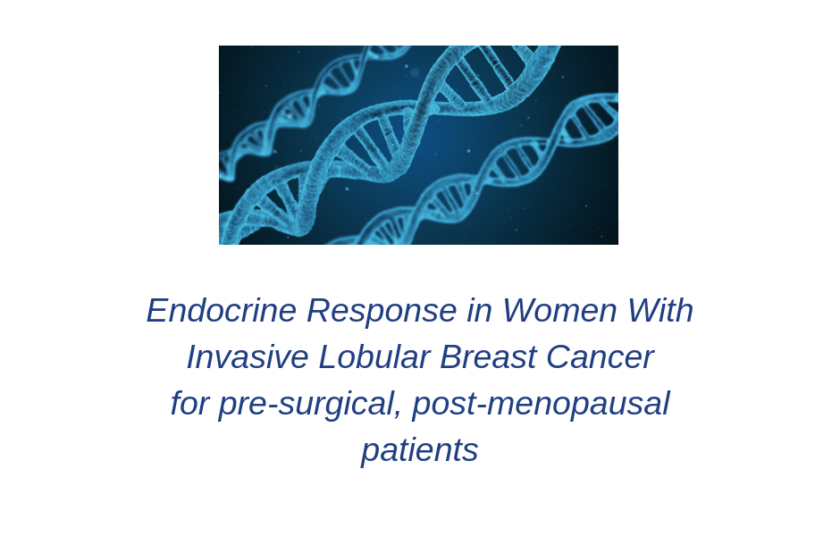May, 2020 by Priscilla F. McAuliffe MD PhD, Beth Z. Clark MD, Jennifer M. Xavier PhD, Steffi Oesterreich PhD, Rachel C. Jankowitz MD

The unprecedented COVID-19 pandemic has challenged many aspects of breast cancer care, particularly with respect to oncology clinical trials.
A recent survey conducted by the American Society of Clinical Oncology, (ASCO), which was completed by more than 30 respondents representing both academic and community-based programs, reported that the pandemic led these programs to either stop completely, or to limit screening for and enrollment into clinical trials (1). As of early April, there has unfortunately been a 44% decline in enrollment in National Cancer Institute (NCI) “cooperative group trials,” as a result of the pandemic, and projections suggest that this could drop by more than 60% across the country as time goes on (2). When considering that, prior to the pandemic, estimates from the NCI suggested that only about 3-5% of adult patients with cancer participated in clinical trials, this reduction will have serious consequences related to the contribution of clinical trials to the advancement of breast cancer management.
Covid-19 Impacts Clinical Research
What are the challenges contributing to the reductions seen in the number of patients who are being recruited for or are actively completing clinical trials during the pandemic?
First and foremost is the focus on the protection of both patients and staff from infection with the COVID-19 virus. This is being accomplished by reducing, “in-person” evaluations, tests and treatment and by utilizing telemedical appointments, where appropriate. Since patients sometimes travel in order to participate in clinical trials, COVID-19-related travel restrictions have further limited visits. These reduced patient visits and limited availability of biopsies, tests and labs, as well as the constraints of oncology research support staff working from home or quarantining, can affect the ability of researchers to adhere strictly to clinical trial protocols and regulations. These reductions and restrictions can also affect determination of patient eligibility for studies, the ability to allow fully informed consent, and the success of shepherding patients through on-going studies and follow-up. Regulatory agencies, including the US Food and Drug Administration, have issued guidelines on managing clinical trials during the COVID-19 pandemic, that emphasize flexibility and pragmatism, to both maximize safety and minimize protocol deviations (3).
Covid 19’s Impact on Lobular Breast Cancer Research

When faced with these obstacles in our own clinical trial on lobular breast cancer “Endocrine Response in Women with Invasive Lobular Breast Cancer,” (4) and in making the decision to put it on hold during the height of the COVID-19 epidemic, we were met with another issue: the patients who enroll in this study likely do not derive a direct benefit from participating. As a “window of opportunity” study (5, 6), our clinical trial is designed for post-menopausal patients to receive a short (approximately 3 weeks) course of one of three standard endocrine therapies between their cancer diagnosis and their operation. Tumor biopsies before and after the treatment are collected for translational laboratory research (i.e., for analysis that will yield more effective clinical practice).
While these studies are ideal for identifying important biomarkers to improve patient selection, expediting drug development, and generating hypotheses for larger treatment trials, such a short course of treatment is unlikely to directly affect patient outcomes. To protect patients from an extra trip into the hospital to receive the medication, as well as the fact that elective surgeries in most states were discontinued, thereby making it impossible to get the second tissue biopsy in the appropriate time frame, we held the study. As restrictions in certain states are being lifted, we have reinstated the study paying careful attention to minimizing extra hospital visits. Investigators at each site where the study is open within the Translational Breast Cancer Research Consortium (TBCRC) are individually deciding the unique needs of patients at their respective locations.
Moving Forward
What can we learn from the COVID-19 pandemic that can help improve oncology clinical trials in the post-pandemic future? Perhaps some of the adaptations made to clinical trials as a result of the pandemic, such as relaxation of regulations of “research only” visits, present future opportunities to address barriers to clinical trials (7). Improvement of clinical trial enrollment may be possible with more practical trial designs that make them less burdensome to patients and for their follow-up, perhaps increasing the speed of breast cancer breakthroughs and getting promising new treatments to patients.
References
- Waterhouse DM, Harvey RD, Hurley P, Levit LA, Kim ES, Klepin HD, Mileham KF, Nowakowski G, Schenkel C, Davis C, Bruinooge SS, Schilsky RL. Early Impact of COVID-19 on the Conduct of Oncology Clinical Trials and Long-Term Opportunities for Transformation: Findings From an American Society of Clinical Oncology Survey. JCO Oncol Pract. 2020 May 12:OP2000275. doi: 10.1200/OP.20.00275. [Epub ahead of print]
- https://cancerletter.com/articles/20200508_8/
- Saini KS, de Las Heras B, de Castro J, Venkitaraman R, Poelman M, Srinivasan G, Saini ML, Verma S, Leone M, Aftimos P, Curigliano G). Effect of the COVID-19 Pandemic on Cancer Treatment and Research. Lancet Haematol 2020 Apr 24;S2352-3026(20)30123-X. doi: 10.1016/S2352-3026(20)30123-X. Online ahead of print.
- https://clinicaltrials.gov/ct2/show/NCT02206984
- (Schmitz S, Duhoux F, Machiels JP. Window of opportunity studies: Do they fulfil our expectations? Cancer Treat Rev. 2016 Feb;43:50-7;
- Arnedos M, Roulleaux Dugage M, Perez-Garcia J, Cortes J. Window of Opportunity trials for biomarker discovery in breast cancer. Curr Opin Oncol. 2019 Nov;31(6):486-492.
- https://cancerletter.com/articles/20200501_8/

